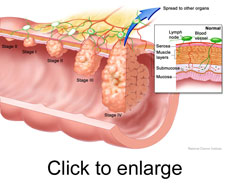Vein Clinic:
‑ Ultrasound Evaluation‑ Sclerotherapy
‑ Mini‑Phlebectomy
‑ Endovenous Laser Therapy

Our Vein Clinic is a state-of-the-art facility providing the latest technological advances in vein treatment, specializing in Endovenous Laser Therapy.
More info...
Colorectal Cancer
 Colorectal Cancer is a malignant tumor that first appears in the colon or rectum. These cancers start in the inner lining of the bowel wall or mucosa. They spread through the wall to surrounding tissue or to the adjacent lymph nodes or nodes in the abdomen. The cancer cells can also travel to distant parts of the body (metastasize).
Colorectal Cancer is a malignant tumor that first appears in the colon or rectum. These cancers start in the inner lining of the bowel wall or mucosa. They spread through the wall to surrounding tissue or to the adjacent lymph nodes or nodes in the abdomen. The cancer cells can also travel to distant parts of the body (metastasize).Known risk factors include:
- age (middle years to older), diet (to much fat), personal history of adenomatous polyps, previous colorectal cancers, family history of colon cancer (hereditary nonpolyposis colorectal cancer - HNPCC, familial adenomatous polyposis -FAP), inflammatory bowel disease (ulcerative colitis).
Symptoms associated with colorectal cancer:
- blood in stool, a change in bowel habits (constipation, diarrhea or mucus in the stool), abdominal discomfort that persists, inability to pass stool or gas, loss of appetite, unexplained loss of weight, narrowing of stools, feeling that the bowel is not emptying completely.
Investigation usually includes: a full physical examination with digital rectal examination, stool test for occult blood and colonoscopy (or barium enema).
Colonoscopy for Screening for Colorectal Cancer is recommended for: patients over 50 years old, with no symptoms or risk factors; patients over 40 years old who have a cole relative with colorectal cancer or adenomatous polyps, very strong family history of colorectal cancer - HNPCCor FAP,personal history of colonic polyps or inflammatory bowel disease.
Treatment:
The primary therapy for colorectal cancer is surgery. During the operation the section of the bowel that contains the cancer is removed, along with the lymph nodes that drain that area.
In the majority of the cases we recommend Laparoscopic Colectomy for the treatment of colorectal cancer.
Usually, at an early stage colorectal cancer is curable by surgery. If metastases to the lymph nodes are found - chemotherapy is usually recomended. In case of rectal cancer chemotherapy and radiotherapy, both, are usually required.
If metastases to the liver occur, depending on the size and location, they can be treated by surgical removal or cryosurgery(freezing of the cancer cells).
Follow-up Care:
- a physical examination and blood tests including liver functions every three months for the first two years, then every six months for up to five years;
- colonoscopy one year after surgery, then yearly for up to five years, then every three to five years for life;
- chest X- ray every six months to a year for five years;
- a CEA test every two months for two years, then every six months for up to five years;
- a CT scan of the abdomen every year for two years;
Contact Us
Minimally Invasive Surgery:
‑ Appendix‑ Bowel
‑ Gallbladder
‑ Gastro‑esophageal Reflux
‑ Hernias
‑ Rectum & Anus
‑ Spleen
‑ Varicose Veins
Endoscopy:
‑ Gastroscopy‑ Colonoscopy
Other:
‑ Breast‑ Thyroid